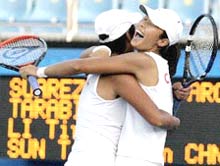| Tools: Save | Print | " target="_blank" class="style1">E-mail | Most Read |
| A Golden Era for Tennis in China? |
| Adjust font size: |
What led to the success? First of all, China recognized the need to look overseas to develop the sport: "Tennis is different from many other sports, because you cannot make any progress without heavy investment," said Sun Jinfang. This tennis coach certainly hit the nail on the head. When she took office as the director of the Chinese Tennis Association (CTA) she devoted herself to developing professionalism in tennis in a country where table tennis and badminton were still the major attractions. During the two years following her appointment, Chinese players were to benefit greatly from frequent participation in overseas tournaments and professional competitions. This was a time when China invested no less than 6 million yuan or US$725,000 in sending its women tennis players to compete abroad. Spending in developing men's tennis took the total to over US$1,200,000. The investment paid off in a big way at the Athens Olympics. Secondly, scientific methods were applied to training and competition preparation: With funding and other operational difficulties now overcome, the players and their coaches were free to concentrate fully on match preparation. They attached great importance to stamina training and to developing technical expertise and speed in such areas as the serve and the return of serve. Training included plenty simulated and actual competition experience. The players set out to accumulate points first in the lower-level tournaments to prepare themselves for the more demanding competitions to follow. In the first half of last year, the Chinese players took part first in the easier International Tennis Federation (ITF) competitions. Six months later, they were ready to take part in the World Tennis Association (WTA) and other top tournaments. Thirdly, new opportunities were created for players to develop their skills through competing in home-based tournaments: Sending athletes abroad for high-level competitions may be the number one choice but when funds are limited, this is not always possible. Recognizing this, the CTA took the initiative and succeeded in increasing what had been 10 home-based competitions in 2001, to as many as 19 in 2004. The prize-money also soared from US$1,200 to over US$70,000. A time to be realistic Li Ting and Sun Tiantian have earned a place for themselves in Chinese tennis history and in the hearts and minds of the Chinese people. However, their victory needs to be viewed in perspective with the recognition that much still remains to be done. Olympic tennis cannot be lumped together with Wimbledon and the other major top-level tournaments. What's more, a single medal is not enough to prove there has been a qualitative breakthrough in the game in China. For one thing, since tennis became an Olympic Sport in 1988, many world-class professionals have shown a distinct lack of interest in competing in the Olympics. Serena Williams, Jennifer Capriati, Guillermo Coria, Gaston Gaudio and many of the world's other top names were just not there at the Athens Games. In addition, many think that the early elimination of Venus Williams and other top seeds was instrumental in the Chinese players' victory. Then there is the special requirement for an Olympic doubles pair to comprise two players from the same country. Top professional tennis doubles are often made up of players from different countries. At Athens, many had to play temporarily with an unfamiliar partner. This lack of co-ordination made it easier for the Chinese players to achieve a surprise win for they had trained all along as a pair. The gold medal has come more as a temporary boost than proof of a new era in China's tennis. As Li Ting said, "Winning the number one position in this tournament does not mean we are number one in the world. We are realistic about the actual position of China's tennis. Our win today does not mean China has become a major force in tennis." Looking to the future Then just what does the Olympic gold medal mean for China? "It can spark a new interest in tennis among the Chinese people," explained Yu Liqiao, the gold medal winners' coach. As Yu correctly anticipated, China is already seeing an unprecedented popular enthusiasm for the sport. "Since China's Li and Sun won the doubles gold, the tickets for the China Open 2004 Tennis Championship are going very quickly," said Jonathan Krane, president of ticketing agents, Emma Ticket. This star-studded tournament bringing together the ATP and WTA is scheduled for September 10-26 in Beijing. It has become a hot topic among the local citizens. According to Krane, the current best sellers are the VIP tickets at US$1,570, followed by tickets for the full-tournament at US$1,328, the semi-finals at US$82 and the final at US$155. The booming middle class that is now so much a feature of many of China's big cities will make for an increasingly mature tennis market. However as Xia Jiaping, former world university games champion says, "This fashionable tennis is not the same as the competitive game. Professional tennis players hope the gold medal will lead to some fundamental developments in tennis training and competitions in China." Xia believes that the surprise Olympic gold victory will draw the attention of the nation's top leaders to the development of the game with more funds being invested and a much-improved environment for training aspiring youngsters. Sun Jinfang has revealed that in the near future the CTA will pay millions of yuan to bring in foreign coaches to help train China's teenage players. They will also provide fresh opportunities for promising young coaches over here to learn advanced international methods as the key to addressing the main weaknesses remaining in this attractive sport. (China.org.cn by Li Xiao, September 10, 2004) |
| Tools: Save | Print | " target="_blank" class="style1">E-mail | Most Read |
 |
| Related Stories |
|

